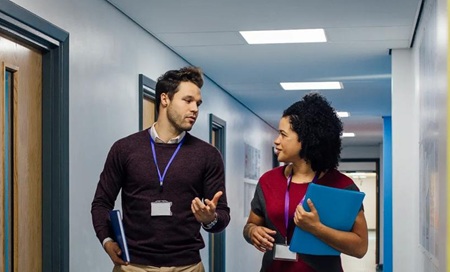Higher education digital transformation
The last 12 months have seen radical changes in how universities deliver learning to students, this online revolution has sadly been forced upon us by a pandemic, but many universities were already on this digital journey.
To reflect the rest of the modern world a digital transformation is necessary in many areas of academia. The last 12 months have seen radical changes in how universities deliver learning to students, this online revolution has sadly been forced upon us by a pandemic, but many universities were already on this digital journey. Examples pre-pandemic have included universities looking at innovative ways to use the vast data sets held and methods to manage international student services via engaging technology.
Since the switch to online learning a common dilemma across universities and other higher education institutions (HEIs) has been the practicality of uploading recorded lectures online, and the desire to ensure student engagement. On the one-hand recorded lectures provide an invaluable resource for students to refer back to, as they are able to hear their lecturers explain course material as many times as they require. Alternatively, this means that students see less and less purpose and need for physical attendance and miss out on engaging with peers on a more natural basis.
A balance needs to be found between the advantages and disadvantages of these technological advancements. The below addresses some of the key areas in which digital transformation can support this, whilst also highlighting some of the risks and legal concerns.
Content
HEIs are built on the content which they produce. This extends beyond lectures for students and into content such as articles and research papers. To foster academic growth and collaboration, the cloud and a shared database provides a solution which would combine sources into one area. Not only would this provide ease of access to content, but it would also give a much broader perspective on a particular topic. For example, say an academic is researching a particular medicine, technology could allow a search for its name and the results would show not only its scientific development but also the historical research made into its creation. This would give better context around its development.
However, a balance should be struck here. Access to wider resources also creates the potential for diluted results. It becomes harder to search for a specific piece of information when every search result creates thousands of outputs. The technology needs to be supported by focused search bar tools and effective methods of filtering to generate the most relevant (and likely) answer. To ensure successful software is procured, universities need to have thorough, well-thought through technical requirements, a procurement strategy to ensure appropriate buy-in from the market and ideally, robust terms and conditions they would be prepared to purchase on. All too often we see supplier terms and conditions which do not protect a university appropriately for some of the risks associated with these types of platforms.
In addition, opening up access to such cloud platforms, especially as our example outlined, related to research data, can result in challenges around protecting university intellectual property (IP). IP rights, usage rights and potential protections should be considered at all stages of procurement for such software solutions.
Resources
The development of software across academia is also increasingly important and will play a crucial role in a digital transformation. Beyond the obvious office and emailing tools there are programming languages and file-sharing services that can aid institutions. An appreciation of the possibilities which these pieces of software can offer should be instilled. In addition to providing clear efficiency gains and the platforms can and will provide enhanced learning experiences by reflecting the digital environments in which those in industry are already working. By using them, students will develop the skills and knowledge to use the applicable software post-graduation in their chosen fields. Academics will also be more attuned to what is used in-industry. All of this would provide more useful and applicable research.
There is, however, a high barrier to access for this software. Costs will run high for universities already on stretched finances. Furthermore, it also requires the investment of teaching time that ensures students and staff can effectively use the relevant tools. Use of industry tools is important in any curriculum however, for entrenched academics it may be harder to encourage active participation.
Legally, some of the suppliers of these tools will always expect to contract on their own standard terms. These are often not appropriate for universities. A way to pre-empt these challenges is to have a thorough procurement strategy which includes, as a minimum, your key terms, if not your anticipated full terms and conditions, allowing potential providers to consider if they can accommodate the specific nuances you require. In addition, universities can do some advance work, if there is a known solution out there. Often legal terms are readily available so universities can review these terms ahead of making approaches and take a risk-based approach as to how they would like to do business with such companies.
An increasing need
It is becoming increasingly crucial that the digital world is appropriately addressed in HE.
As the world becomes digitised there is a need to scrutinise and support the networks which are being created. HEIs in their research capacity, will be relied upon to provide this analysis of emerging technologies. Large tech organisations and their methods of using data are of growing concern. A research-led approach to dealing with such issues is ever more important and would provide a solution to the requisite checks and balances these companies need.
Starting a digital transformation in HE also ensures that student talent introduced into the market will start from a strong base in digitised working. This extends beyond teaching with industry level tools but also the ethics and compliance around the use of such systems. Data is a valuable and dangerous asset which should not be treated lightly, with scandals such as Cambridge Analytica having exposed the potential damages arising from the misuse of data.
Conclusion
Work is needed to be done to introduce a full digital transformation into HE. Doing so would further support the access to content and resource necessary in a digitised world. Yet this must be an informed introduction which ensures tools help, rather than hinder, learning in addition to ensuring it does not expose universities to undue legal risk.
In the background, there should always be an appreciation of the power of the digital world because, much like fire, it can be both friend and foe.
Contact

Mark Hickson
Head of Business Development
onlineteaminbox@brownejacobson.com
+44 (0)370 270 6000








































